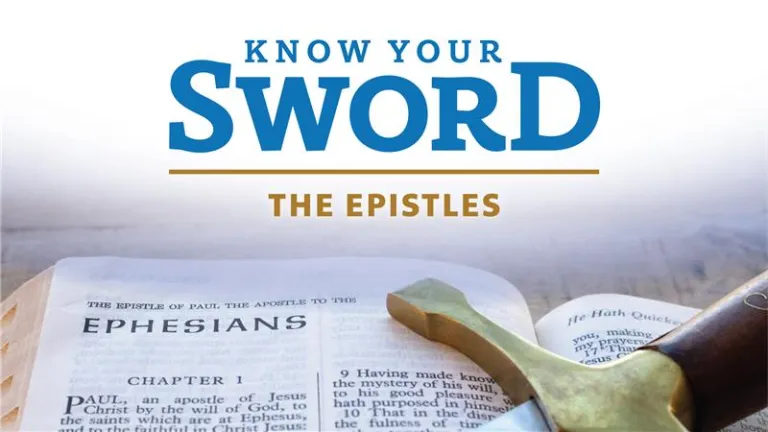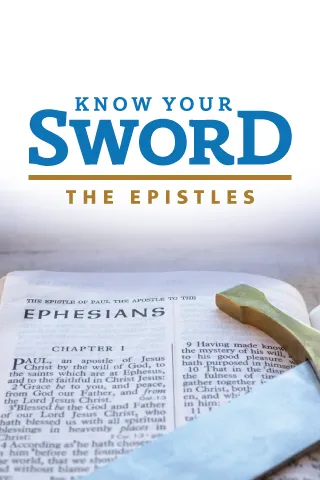Ephesians Part 06

In the Temple at Jerusalem, there was an actual wall separating the Court of the Gentiles from the inner courts where only Jews could go. Inscribed warnings threatened death to any Gentile who dared to cross that barrier.
Paul, having reminded the Gentiles that they once were aliens from the commonwealth of Israel, writes in Ephesians 2:13-16,
“But now in Christ Jesus you who once were far off have been brought near by the blood of Christ. For He Himself is our peace, who has made both one, and has broken down the middle wall of separation, having abolished in His flesh the enmity, that is, the law of commandments contained in ordinances, so as to create in Himself one new man from the two, thus making peace, and that He might reconcile them both to God in one body through the cross, thereby putting to death the enmity.”
This is the turning point—the reconciliation of two groups that had long been separated. Through Christ’s sacrifice, the wall that divided Jew and Gentile was torn down. Paul calls it “the middle wall of separation.”
In the Jerusalem Temple, a physical barrier divided the Court of the Gentiles from the inner courts accessible only to Jews. Archaeological findings and the writings of Josephus confirm that inscriptions were posted on this wall, warning Gentiles that entering beyond it would bring death upon themselves. The Expositor’s Bible Commentary notes that Paul uses two terms—phragmos (a fence or railing) and mesotoichon (a middle wall)—both of which Josephus used in reference to that literal dividing barrier. It symbolized centuries of religious and ethnic separation.
This image would have been vivid to his readers. The wall symbolized centuries of hostility, prejudice and separation. In Acts 21:29, Paul himself was falsely accused of bringing a Gentile named Trophimus beyond that dividing wall—an accusation that led to his arrest. This was no small matter; it represented the fierce division between the “unclean” Gentiles and the “chosen” Jews.
Yet Paul boldly writes that this wall has already been demolished—not by Roman siege, which would come later in A.D. 70, but by the cross of Christ. The wall still stood physically when Paul penned these words, but spiritually, it was gone. The dividing line had been erased.
The barrier between Jew and Gentile, Paul says, consisted of “the law of commandments contained in ordinances.” These “ordinances” (dogma in Greek) refer not to the eternal moral law of God, but to man-made regulations and ceremonial distinctions that had been used to separate peoples. Jewish tradition had developed extensive social prohibitions that went far beyond what God had commanded—including eating with Gentiles and entering their homes.
Peter himself struggled with these traditions until God corrected him in Acts 10. When summoned to the home of Cornelius, a Gentile centurion, Peter protested:
“You know how unlawful it is for a Jewish man to keep company with or go to one of another nation” (verse 28).
But then he added, “God has shown me that I should not call any man common or unclean.” God never commanded such restrictions; they were the product of human dogma and self-righteous separation.
As the UCG booklet The New Covenant: Does It Abolish God’s Law? explains, the Greek term dogma literally refers to formalized decrees or regulations—often man-made—and is used in these passages to describe rules that created division and hostility. Paul’s context in both Ephesians 2:15 and Colossians 2:14–20 shows he is addressing “the commandments and doctrines of men,” not the righteous law of God. God’s law defines love and holiness; man’s ordinances foster prejudice and exclusion.
Christ came to destroy that enmity. By His death, He broke down the middle wall of separation—not by abolishing God’s law, but by removing the hostility that had grown around it. In doing so, He created peace between those who had been far off and those who had been near. Both Jew and Gentile now have access to the Father through one Spirit. The gospel unites what sin and pride had divided.
God’s laws are timeless, righteous and good. They reveal how to love Him and how to love one another. But human traditions often distort that purpose, adding burdens or restrictions that God never commanded. Scripture warns: “Do not add to, nor take away from.” The true law of God always leads to unity, peace and love; the laws of men often lead to prejudice, hostility and division. Through Christ, those barriers are dismantled, and all who believe are invited to become one family—a spiritual nation, no longer defined by race or heritage, but by faith and obedience to God.
UYA Team | uya@ucg.org
United Young Adults (UYA) primarily serves the 18–32-year age group for the United Church of God. There are three main areas of contribution to the lives of the young adults: Promoting Spiritual Growth, Developing Meaningful Relationships and Making the Most of Your Talents. The Know Your Sword series is a daily expository message introducing God’s Word from a trusted perspective.


